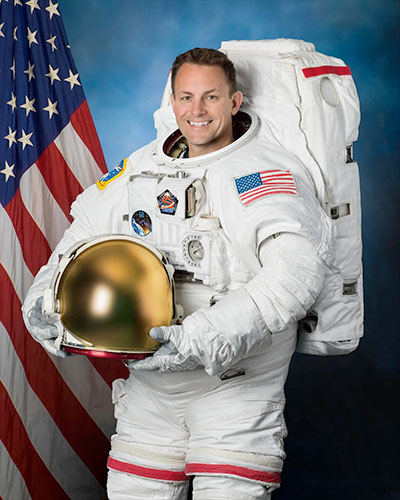Three-time Spacewalker Josh Cassada Retires from NASANASA astronaut Josh Cassada retired Oct. 1, after 11 years of service to the agency across multiple programs, including 157 days in space and three spacewalks. Cassada also is a retired United States Navy captain and naval aviator with more than two decades of service.
Cassada served as pilot of NASA's SpaceX Crew-5 mission and Expedition 68 flight engineer aboard the International Space Station, executing myriad maintenance, contingency, and upgrade activities inside the station while also contributing to hundreds of experiments and technology demonstrations. His three spacewalks outside of the orbiting laboratory totaled more than 21 hours, successfully installing a pair of International Space Station Roll-Out Solar Arrays (IROSAs) to boost the station's electrical capacity. Cassada, alongside crewmate NASA astronaut Frank Rubio, also assembled the infrastructure for a future IROSA installation and fully restored a malfunctioning legacy solar array.
"I want to extend my sincere gratitude to Josh for his dedication and service to human space exploration," said NASA Johnson Space Center Director Vanessa Wyche. "Josh's contributions and achievements to the advancement of science and exploration will inspire the next generation of explorers, the Artemis generation, and benefit humanity for decades to come."

Throughout Expedition 68, Cassada and his crewmates completed extensive problem-solving with ground teams, including the modification of the SpaceX Dragon spacecraft to accommodate an additional crew member in the event of an emergency return, and leveraged the crew's various skill sets and training to ensure continued safe and effective operations for current and future crews.
In Houston, Cassada served as a capsule communicator in NASA's Mission Control Center and assistant to the chief of the Astronaut Office for space station operations. As a physicist and test pilot, Cassada also contributed to the development of NASA's Commercial Crew Program and Orion spacecraft and represented the Astronaut Office in technical and operational reviews of scientific experiments such as the Alpha Magnetic Spectrometer and Cold Atom Lab.
"Josh has played a significant role in NASA's deliverance of reliable and cost-effective human transportation to and from the space station," said Norm Knight, director of flight operations at NASA Johnson. "Through his dedication and commitment to human spaceflight exploration, Josh's work will continue to push us forward on our journey back to the Moon, and beyond. We will miss him and are excited to see what his next journey entails."
As he transitions from government service, Cassada will return to the private sector, working on extremely low light detection technologies with broad and emerging applications in various areas, including quantum networks and computing, remote sensing, long-range communication, semiconductor manufacturing, and medical imaging.
"I am incredibly grateful for my many opportunities here at NASA," Cassada said, "and especially to have served alongside some of the most amazing people both on and off our planet, accomplishing things that are only possible when we work and innovate together as a team. As humans, we explore . And each scientific adventure, whether in a lab on Earth or in space, requires courage to explore and advance society. I am incredibly fortunate to have been surrounded by explorers during my entire career so far and going forward. An expedition may seem daunting, but it's a lot less so when you're prepared and with the right crewmates."
Before his selection by NASA in 2013 as a member of NASA's 21st Class, Cassada earned his doctorate in High Energy Particle Physics from the University of Rochester, New York and was a U.S. Navy pilot, instructor pilot, test pilot, and instructor test pilot. Throughout his career, Cassada has accumulated more than 4,000 flight hours in over 50 different aircraft and has been awarded various military and civilian awards.
Cassada graduated from White Bear Lake Area High School in Minnesota in 1991 and received his bachelor's in Physics in 1995 from Albion College in Michigan.












